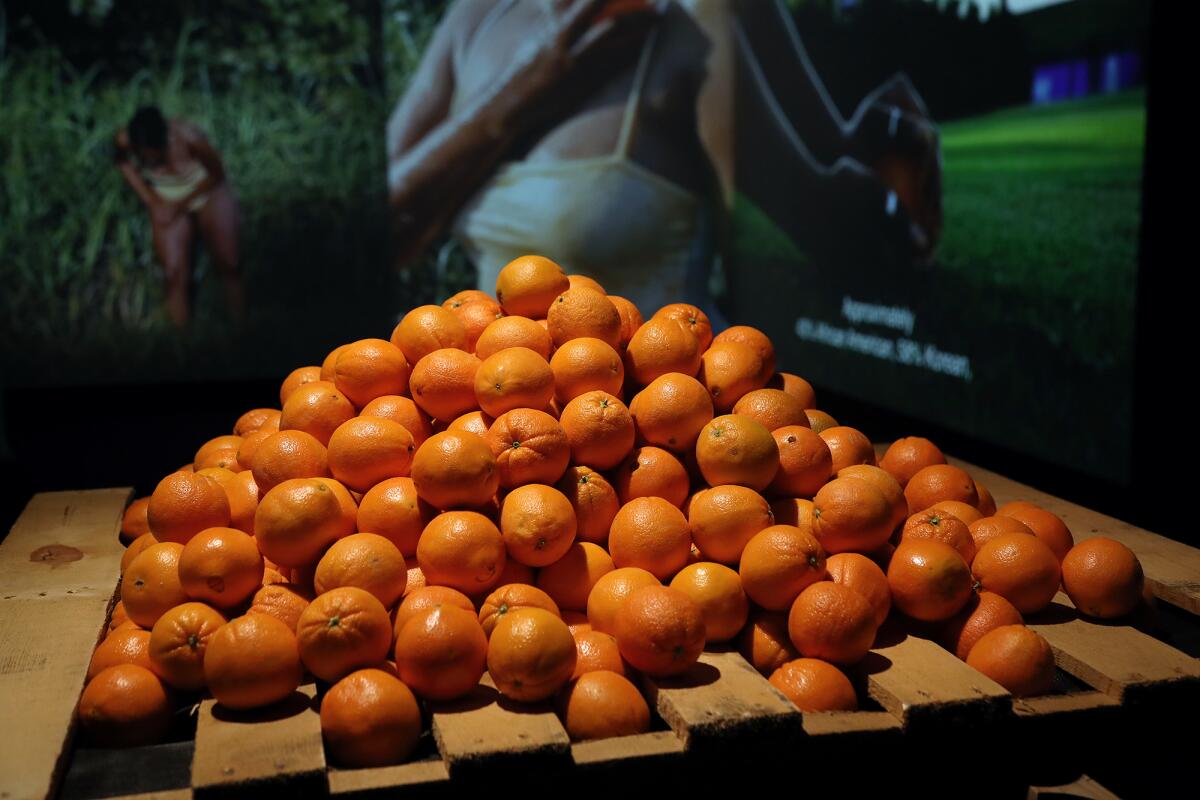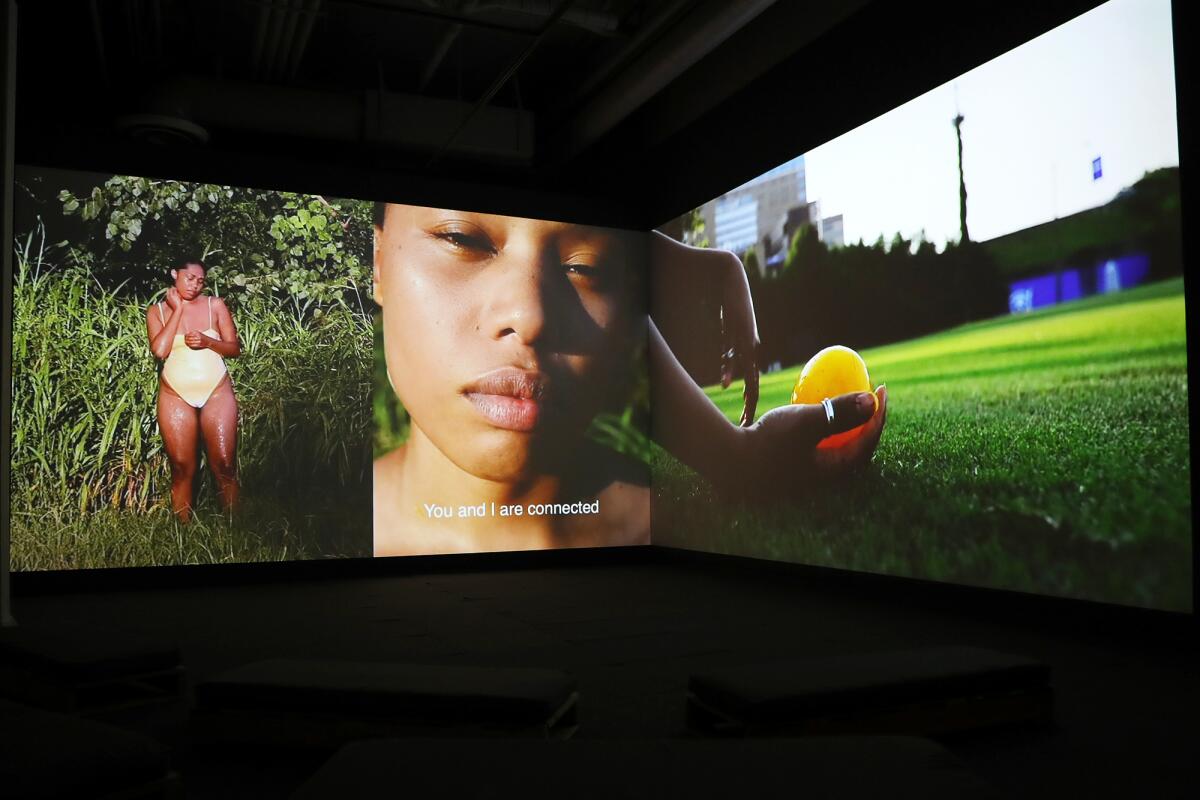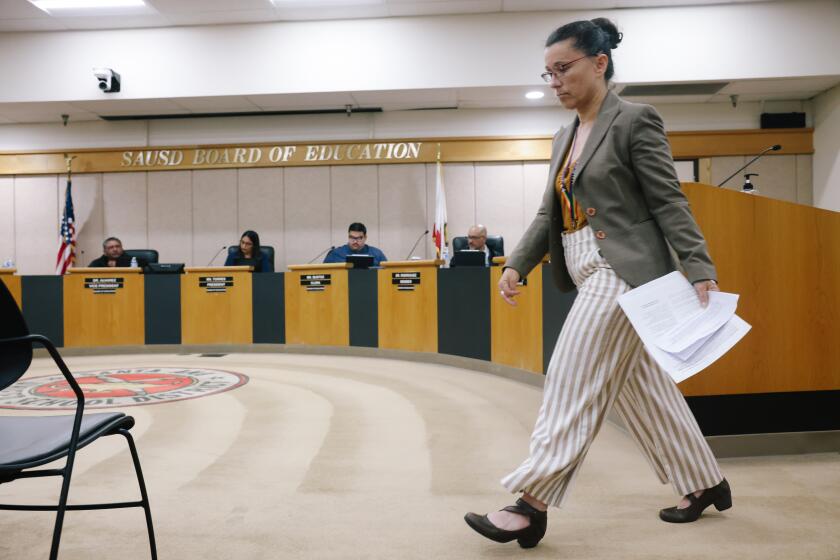Visual artist squeezes meaning from double-channel video at Grand Central Art Center

- Share via
In 1991, Latasha Harlins walked into Empire Liquor in Los Angeles to buy orange juice. When store owner Soon Ja Du accused the 15-year-old of stealing the orange juice, a confrontation ensued that ended with Du killing Harlins.
“Even though she was trying to pay, they got in an altercation and Latasha Harlins was shot in the back of the head,” said visual artist Larissa Rogers.
Du was later convicted of manslaughter in the killing.
The incident contributed to the brewing racial tension in South Central Los Angeles at the time that came to a head with the beating of Rodney King and the five days of riots in 1992 that followed the acquittal of the four police officers involved.
But during the summer of 2020, Harlins and Du were on Rogers’ mind as she processed the cultural climate as the Black Lives Matter movement gained momentum.
It was during this time that Rogers filmed the double-channel video featured in her exhibition, “We’ve Always Been Here, Like Hydrogen, Like Oxygen,” which opens Sept. 3 at Santa Ana’s Grand Central Art Center and runs through Nov. 6.
The videos are projected on two massive walls that come together in a corner. Rogers uses the space to direct the viewer toward the idea of being trapped but also expanding out.
Rogers shot the videos on the Richmond Slave Trail and the African Burial Ground in Richmond, Va. and said during the early pandemic lockdown, she realized more people were spending time outdoors, in these spaces, without fully understanding them.
“There is about a 2-mile trail up to where the auction block and auction houses were,” said Rogers, “but both of these spaces had been turned into spaces of recreation so people would be boating — there wasn’t much signage of what it was.”
Rogers carefully — and sometimes roughly — washes her body with oranges on one screen and caresses an orange cast of orange juice on the other.
“I started using oranges in my practice in reference to Latasha Harlins’ murder,” said Rogers. “This orange starts to represent a multitude of things.”

Rogers is Afro Asian, born in Charlottesville, Va. to a Korean immigrant mother and an African American father. She explores both identities and how she situates within the narrative of the Harlins killing.
“Latasha Harlins was a 15-year-old Black girl; Soon Ja Du, a Korean immigrant,” said Rogers. “There are so many gaps and separations between being able to understand each other and each other’s experiences. A lot of prejudices are happening, from the murder to even what justice can look like.”
For Rogers, the orange stands in for the erasure of Black and Brown women, but it is also a hybrid food by nature, native to Asia and brought to the Americas by colonization.
“In the video, you see me at the Richmond Slave Trail and the African Burial Ground, with real oranges and oranges that I made cast of orange juice, washing my body,” said Rogers. “It is this act of self-care, but also as I am washing my body, these oranges are melting. The washing at sometimes can seem a little aggressive, so thinking about the relationship between care and violence.”
Part of the text on the video is lifted from Rogers’ own personal journals and a letter she penned to Du that she never sent but wrote as a way to grapple with the tensions between the Korean and Black communities.
“When I started to do this work, I had to really sit with myself,” said Rogers.
It is also appropriate the show opens in Orange County where the fruit holds its own symbolism.
“This is perfect because this is the first time the work is showing in California and what a perfect location,” said Rogers.
In addition, a sculpture crafted from shipping pallets and 115 pounds of fresh oranges will accompany the video work. Rogers said in Virginia there are many monuments, of Confederate men set in brass that haven’t evolved over the years, physically or symbolically. Rogers’ sculpture will be one that is meant to change.
“This sculpture is a monument for a 15- year-old Black girl,” said Rogers.
All the latest on Orange County from Orange County.
Get our free TimesOC newsletter.
You may occasionally receive promotional content from the Daily Pilot.




